Financial institutions are determined not to be left behind as mobile person-to-person payments gain popularity and non-bank players invade the market. On Monday, Early Warning Services LLC, a company controlled by some of the nation’s biggest banks, said its Zelle P2P service has grown to include 20 banks and credit unions that last year collectively processed more than 170 million P2P transactions worth $55 billion,
Zelle, which is rolling out nationwide as 2017 unfolds, will, by the middle of the year, reach 85 million consumers through mobile apps offered by the currently enrolled institutions, Early Warning said. A separate, standalone Zelle app will bring the service to “millions more,” Early Warning said.
As with other P2P services, Zelle promises to move money from sender accounts to those of recipients in near real-time, which typically means within minutes. The service builds on a network of financial institutions that was formerly known as clearXchange. Scottsdale, Ariz.-based Early Warning, a specialist in risk management for bank transactions, acquired clearXchange in 2015, renamed the service Zelle last year, and has been working to promote the brand to consumers.
So far, Bank of America, U.S. Bank, and Wells Fargo, three of the seven banks that own Zelle, have encoded “aspects” of the Zelle service in their mobile apps. Other institutions in the network are set to launch in the latter half of this year, according to Early Warning, which is enforcing a common standard for design and experience. “We’re on a mission to replace cash and checks with a faster, safer, and easier way to pay,” Lou Anne Alexander, group president for payments at Early Warning Services, said in a statement.
Other major institutions in the network include BB&T, Capital One, Chase, Citi, Fifth Third Bank, PNC, TD Bank, and USAA. A full list of participating institutions is here.
The banks are trying to win share in a market that has drawn a number of high-profile tech companies. PayPal Holdings Inc.’s popular Venmo service, which combines speedy P2P payments with social-media capability, appeals to younger consumers and is growing at a blazing-fast rate. In the fourth quarter, it posted $5.6 billion in volume, up 126% year-over-year. Only two years earlier, it had not yet breached $1 billion in payments.
Firms like Facebook Inc. and Square Inc., too, have targeted the market in a bid to allow users who hold debit cards to send money instantly to other users with debit cards. With chatbot capability now part of Facebook Messenger, these transfers have become even easier for users.
But the banks behind Zelle aren’t without success stories of their own. QuickPay, a P2P app offered by Zelle owner institution Chase, processed $28 billion in payments in 2016, up 38% over 2015, on 94 million transactions. By contrast, Venmo’s volume in 2016 came to $17.6 billion.
“Consumers are asking for simple ways to pay for everyday things,” said Thong Nguyen, president of retail banking at Bank of America, in a statement. “With Zelle, we’ll collectively reach more U.S. bank consumers than any other person-to-person payments network.”





